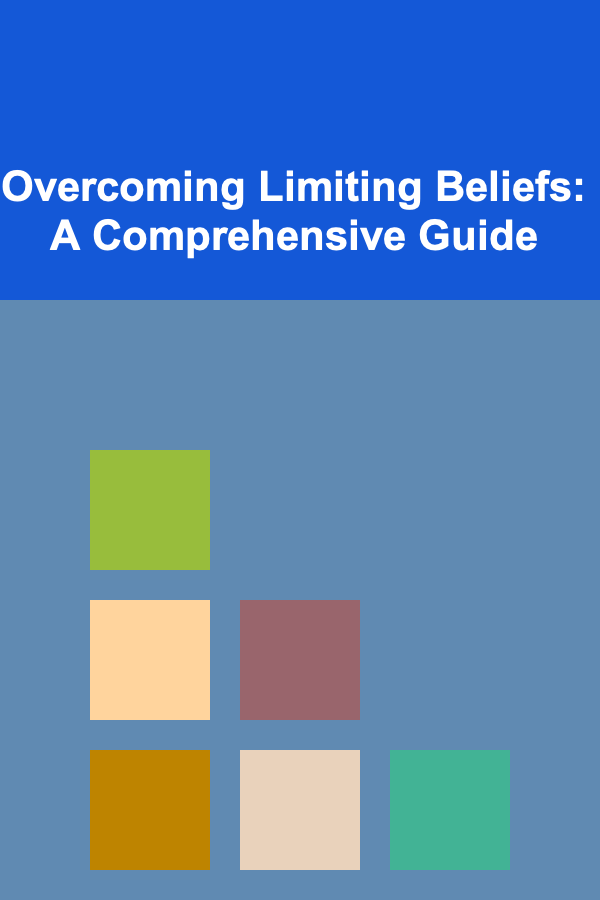
Overcoming Limiting Beliefs: A Comprehensive Guide
ebook include PDF & Audio bundle (Micro Guide)
$12.99$7.99
Limited Time Offer! Order within the next:

Limiting beliefs are the silent saboteurs of our potential. They are ingrained assumptions and negative self-perceptions that hold us back from achieving our goals, pursuing our dreams, and living a fulfilling life. These beliefs, often formed in childhood or through past experiences, can manifest as doubts, fears, and anxieties that prevent us from taking risks, seizing opportunities, and believing in ourselves.
This comprehensive guide will delve into the nature of limiting beliefs, exploring their origins, impact, and, most importantly, providing a practical roadmap for identifying, challenging, and ultimately overcoming them. By understanding the power of your own mind and implementing effective strategies, you can break free from the shackles of limiting beliefs and unlock your true potential.
Understanding Limiting Beliefs
A limiting belief is a thought or conviction we hold about ourselves, others, or the world around us that constrains our potential and prevents us from achieving what we are capable of. These beliefs are often deeply ingrained and operate on a subconscious level, making them difficult to recognize and challenge. They can manifest in various areas of life, including:
- Career: "I'm not smart enough to get promoted." "I'm not good at public speaking." "I'll never be successful in this field."
- Relationships: "I'm not lovable." "I'll always be alone." "No one will ever understand me."
- Finances: "I'm not good with money." "I'll never be rich." "Money is the root of all evil."
- Health: "I'm destined to be unhealthy." "I'll never be able to lose weight." "I'm too old to start exercising."
- Personal Growth: "I'm not creative." "I'm not good at learning new things." "I'm too shy to express myself."
These statements, while seemingly insignificant, can have a profound impact on our behavior and choices. They influence our thoughts, feelings, and actions, creating a self-fulfilling prophecy. If you believe you're not good at public speaking, you're less likely to volunteer for presentations, further reinforcing your belief and limiting your opportunities for growth.
The Origins of Limiting Beliefs
Limiting beliefs are rarely innate; they are typically learned through a variety of experiences, including:
- Childhood Experiences: Early childhood experiences, particularly interactions with parents, teachers, and peers, play a crucial role in shaping our beliefs about ourselves and the world. Criticism, rejection, or neglect can lead to feelings of inadequacy and the development of negative self-perceptions. For instance, a child who is consistently told they are "lazy" may internalize this belief and struggle with motivation and productivity throughout their life.
- Past Failures: Unsuccessful experiences can create beliefs about our abilities and potential. A failed business venture, a difficult relationship, or a poor academic performance can lead to the belief that we are incapable of achieving success in similar endeavors. It's important to remember that failure is a part of the learning process, but dwelling on past mistakes can solidify limiting beliefs.
- Social Conditioning: Society, culture, and media often perpetuate certain beliefs and expectations that can be limiting. Gender stereotypes, societal norms, and unrealistic portrayals of success can influence our beliefs about what is possible for us. For example, women may internalize the belief that they are less capable in STEM fields, even if they possess the skills and aptitude.
- Traumatic Events: Traumatic experiences can have a profound impact on our beliefs about safety, trust, and control. A traumatic event can lead to the belief that the world is a dangerous place and that we are powerless to protect ourselves. This can manifest as anxiety, fear, and a reluctance to take risks.
- Role Models and Mentors: Ironically, even well-intentioned advice or the observed limitations of our role models can contribute to limiting beliefs. Seeing someone we admire struggle in a particular area can lead us to believe that we are also destined to face the same challenges. It's important to critically evaluate the beliefs of others and determine whether they align with our own goals and aspirations.
The Impact of Limiting Beliefs
The consequences of holding onto limiting beliefs can be far-reaching and detrimental to our well-being and success. Some of the key impacts include:
- Reduced Self-Esteem: Limiting beliefs erode our self-confidence and self-worth. They create a constant sense of doubt and inadequacy, making it difficult to believe in our abilities and potential. This can lead to feelings of anxiety, depression, and low self-esteem.
- Missed Opportunities: Limiting beliefs prevent us from taking risks and pursuing opportunities that could lead to personal and professional growth. Fear of failure or rejection can paralyze us and keep us stuck in our comfort zone. We may avoid challenging ourselves or venturing into new territories, ultimately limiting our potential for success.
- Self-Sabotaging Behavior: Limiting beliefs can lead to self-sabotaging behavior, where we unconsciously undermine our own efforts. This can manifest as procrastination, perfectionism, or negative self-talk. For example, if you believe you are not good enough, you may procrastinate on important tasks or engage in negative self-talk that sabotages your performance.
- Strained Relationships: Limiting beliefs can negatively impact our relationships with others. If you believe you are not lovable, you may push people away or engage in behaviors that sabotage your relationships. Low self-esteem and insecurities can lead to jealousy, possessiveness, and difficulty trusting others.
- Unfulfilled Potential: Ultimately, limiting beliefs prevent us from reaching our full potential. They create a glass ceiling that we are unable to break through, limiting our ability to achieve our goals and live a fulfilling life. By challenging and overcoming these beliefs, we can unlock our true potential and create a life that is aligned with our values and aspirations.
- Increased Stress and Anxiety: The constant internal battle against your perceived limitations is inherently stressful. It leads to anxiety about performance, fear of judgment, and a general feeling of being overwhelmed. This chronic stress can have negative consequences for both mental and physical health.
- Difficulty Adapting to Change: Limiting beliefs often create a rigid mindset. They make it difficult to adapt to new situations, embrace change, and learn from mistakes. A person who believes they are "not good with technology" may resist learning new software or devices, hindering their ability to adapt to the evolving demands of the modern workplace.
Identifying Your Limiting Beliefs
The first step in overcoming limiting beliefs is to identify them. This requires self-reflection, honesty, and a willingness to challenge your own assumptions. Here are some strategies to help you identify your limiting beliefs:
- Pay Attention to Your Thoughts: Become aware of your inner dialogue. What are the thoughts that run through your head on a daily basis? Are they positive and empowering, or negative and self-critical? Pay particular attention to thoughts that trigger feelings of fear, anxiety, or inadequacy.
- Examine Your Emotional Reactions: Our emotions often provide clues about our underlying beliefs. Notice when you experience strong emotional reactions, such as anger, sadness, or fear. Ask yourself what belief might be triggering this emotion. For example, if you feel angry when someone criticizes you, it might be because you believe you need to be perfect.
- Analyze Your Behaviors: Our behaviors often reflect our underlying beliefs. Identify patterns of behavior that are self-sabotaging or that prevent you from achieving your goals. Ask yourself what belief might be driving this behavior. For example, if you consistently procrastinate on important tasks, it might be because you believe you are not capable of completing them successfully.
- Listen to Feedback from Others: Sometimes, others can see our limiting beliefs more clearly than we can ourselves. Ask trusted friends, family members, or colleagues for feedback on your behavior and attitudes. Be open to hearing their perspectives, even if they are difficult to hear.
- Journaling: Journaling is a powerful tool for self-reflection. Write about your goals, your fears, and your challenges. As you write, pay attention to any recurring themes or patterns that emerge. These patterns may reveal underlying limiting beliefs. Try prompts like: "What am I most afraid of failing at?" or "What do I believe I am incapable of doing?"
- The "Five Whys" Technique: This technique, often used in problem-solving, can be applied to identifying the root cause of a limiting belief. Start with a statement about a challenge you're facing and repeatedly ask "Why?" until you reach the core belief. For example:
- Statement: I'm afraid to ask for a raise.
- Why? Because I don't think I deserve it.
- Why? Because I haven't achieved enough.
- Why? Because I feel inadequate compared to my colleagues.
- Why? Because I believe I'm not as talented as they are.
- Why? Because I believe I'm inherently less capable. The final "Why?" reveals a core limiting belief about inherent capability.
Once you have identified a limiting belief, write it down and acknowledge its presence. This is the first step in challenging its validity.
Challenging and Replacing Limiting Beliefs
Once you have identified your limiting beliefs, the next step is to challenge their validity and replace them with more empowering beliefs. This is a process that requires conscious effort, patience, and persistence. Here are some effective strategies:
- Question the Evidence: Examine the evidence that supports your limiting belief. Is it based on facts or assumptions? Is it based on past experiences that may no longer be relevant? Are there alternative explanations for the evidence? Often, you'll find that the evidence supporting your limiting belief is weak or non-existent. For example, if you believe you are not good at public speaking, ask yourself: "What evidence do I have to support this belief?" Have you always failed at public speaking? Or have you had some successes that you are overlooking?
- Seek Contradictory Evidence: Actively look for evidence that contradicts your limiting belief. Focus on your past successes, your strengths, and your positive qualities. Talk to people who believe in you and ask them to share their perspectives. The more evidence you find that contradicts your limiting belief, the weaker it will become. For example, if you believe you are not creative, try engaging in creative activities and seeking feedback from others. You may be surprised to discover that you are more creative than you thought.
- Reframe Your Perspective: Reframe your limiting beliefs by looking at them from a different perspective. Challenge the negative assumptions and interpretations that underlie your beliefs. Look for the positive aspects of the situation and focus on what you can learn from it. For example, if you believe you are not good with money, reframe this belief by focusing on the small steps you can take to improve your financial literacy. Instead of saying "I'm not good with money," try saying "I'm learning to manage my money more effectively."
- Use Affirmations: Affirmations are positive statements that reinforce new, empowering beliefs. Repeat these statements to yourself on a daily basis, focusing on the feelings they evoke. The more you repeat these affirmations, the more likely you are to internalize them and believe them to be true. For example, if you are trying to overcome the belief that you are not lovable, you might repeat the affirmation "I am worthy of love and affection."
- Visualize Success: Visualization is a powerful technique for creating new beliefs. Imagine yourself achieving your goals and overcoming your challenges. Visualize the details of your success, including the sights, sounds, and feelings. The more vividly you visualize your success, the more likely you are to believe it is possible. For example, if you are preparing for a presentation, visualize yourself delivering a confident and engaging speech.
- Challenge the "Shoulds" and "Musts": Limiting beliefs are often expressed as "shoulds" and "musts." "I should be further along in my career." "I must be perfect." These rigid expectations create unnecessary pressure and reinforce feelings of inadequacy. Replace these "shoulds" and "musts" with more flexible and compassionate statements. "I am doing my best, and that is enough." "I am learning and growing every day."
- Practice Self-Compassion: Be kind and compassionate to yourself, especially when you are struggling with limiting beliefs. Recognize that everyone makes mistakes and that it is okay to be imperfect. Treat yourself with the same kindness and understanding that you would offer to a friend. Self-compassion can help you to break free from the cycle of negative self-talk and self-criticism.
- Seek Professional Help: If you are struggling to overcome limiting beliefs on your own, consider seeking professional help from a therapist or counselor. A therapist can provide you with support, guidance, and tools to help you challenge and replace your limiting beliefs. Cognitive Behavioral Therapy (CBT) is a particularly effective approach for addressing limiting beliefs.
- The Power of "Yet": Add the word "yet" to the end of your limiting belief. This simple addition can dramatically shift your perspective. Instead of saying "I can't do this," say "I can't do this yet." The "yet" acknowledges that you are still on a journey and that your abilities can grow and develop over time. It instills a sense of hope and possibility.
- Find a Role Model Who Disproves Your Belief: Seek out individuals who have successfully overcome the limitations you believe you face. If you believe you can't succeed in a certain field because of your background, find examples of people from similar backgrounds who have achieved success. Their stories can serve as powerful inspiration and proof that your limiting belief is not necessarily true.
Maintaining a Growth Mindset
Overcoming limiting beliefs is not a one-time event; it is an ongoing process that requires a commitment to personal growth and a growth mindset. A growth mindset is the belief that your abilities and intelligence are not fixed traits, but rather can be developed through effort, learning, and perseverance. Here are some strategies for cultivating a growth mindset:
- Embrace Challenges: View challenges as opportunities for growth and learning, rather than threats to your self-esteem. Don't be afraid to step outside of your comfort zone and try new things. The more you challenge yourself, the more you will grow.
- Learn from Mistakes: View mistakes as opportunities to learn and improve. Don't dwell on your failures; instead, focus on what you can learn from them. Analyze your mistakes, identify the root causes, and develop a plan for avoiding them in the future.
- Value Effort and Persistence: Recognize that effort and persistence are essential for achieving success. Don't give up easily when you encounter obstacles. Instead, keep working hard and stay committed to your goals.
- Seek Feedback: Actively seek feedback from others and use it to improve your performance. Be open to hearing constructive criticism and use it to identify areas where you can grow.
- Celebrate Progress, Not Just Outcomes: Focus on celebrating your progress and effort, rather than just focusing on the final outcome. Acknowledge the small steps you are taking towards your goals and reward yourself for your hard work.
- Surround Yourself with Supportive People: The people you surround yourself with can have a significant impact on your mindset. Surround yourself with positive, supportive people who believe in you and encourage you to pursue your goals. Avoid negative, critical people who undermine your self-confidence.
- Continuously Learn and Grow: Make a commitment to lifelong learning. Read books, take courses, attend workshops, and engage in activities that stimulate your mind and expand your knowledge. The more you learn, the more you will grow and the more confident you will become in your abilities.
Real-Life Examples of Overcoming Limiting Beliefs
To further illustrate the power of overcoming limiting beliefs, consider these real-life examples:
- The Entrepreneur Who Feared Failure: A aspiring entrepreneur held a deep-seated fear of failure, stemming from a previous business venture that didn't succeed. This fear paralyzed him, preventing him from launching new ideas. Through therapy, he identified the limiting belief: "I am destined to fail in business." He challenged this belief by analyzing his past mistakes, learning from them, and focusing on the lessons he gained. He also started visualizing his success and practicing affirmations that reinforced his competence and resilience. Eventually, he launched a new business that thrived, demonstrating that failure is not a permanent state, but rather a stepping stone to success.
- The Introvert Who Became a Public Speaker: A highly introverted individual believed she was incapable of public speaking. The thought of addressing a crowd filled her with anxiety and fear. Her limiting belief was: "I am too shy to be a good public speaker." She started by taking small steps, such as practicing in front of a mirror and recording herself. She joined a Toastmasters club to gain experience and receive feedback in a supportive environment. She also re-framed her perspective on public speaking, viewing it as an opportunity to share her knowledge and connect with others. Over time, she not only overcame her fear but also became a skilled and confident public speaker.
- The Individual Who Believed They Weren't Creative: A person who worked in a highly analytical field believed they lacked creativity. They avoided any activities that required creative thinking, reinforcing their belief. Their limiting belief was: "I am not a creative person." They challenged this belief by experimenting with different creative outlets, such as painting, writing, and playing music. They realized that creativity is not a fixed trait but rather a skill that can be developed with practice. They started to see creativity in unexpected places, even in their analytical work. They eventually embraced their creative side and found new ways to express themselves.
- The Person Who Thought They Were Too Old to Learn: A retiree believed they were too old to learn new skills. They felt intimidated by technology and resisted learning new software or devices. Their limiting belief was: "I'm too old to learn new things." They challenged this belief by taking a computer class at a local community center. They discovered that learning new things can be challenging but also rewarding. They embraced a growth mindset and focused on the progress they were making, rather than on their perceived limitations. They eventually became proficient in using computers and other technologies, opening up new opportunities for learning and connection.
Conclusion
Limiting beliefs can hold you back from achieving your full potential, but they are not permanent. By understanding the nature of limiting beliefs, identifying your own limiting beliefs, challenging their validity, and replacing them with more empowering beliefs, you can break free from the shackles of your past and create a future that is aligned with your dreams and aspirations. Remember that overcoming limiting beliefs is an ongoing process that requires a commitment to personal growth and a growth mindset. Be patient with yourself, celebrate your progress, and never give up on your potential.
The power to transform your life lies within you. By taking control of your thoughts and beliefs, you can unlock your true potential and create a life of purpose, passion, and fulfillment. Start today, challenge your limiting beliefs, and embrace the possibilities that lie ahead.

How to Declutter Your Home and Simplify Cleaning
Read More
How to Organize Your Home Bar for Stylish Entertaining
Read More
How to Use AR for Asset Management
Read More
Leveraging Social Media in Your Job Search: Strategies for Success
Read More
How To Find New Artists in the Lo-Fi Hip-Hop Scene
Read More
10 Tips for Implementing Traceability in Quality Assurance
Read MoreOther Products

How to Declutter Your Home and Simplify Cleaning
Read More
How to Organize Your Home Bar for Stylish Entertaining
Read More
How to Use AR for Asset Management
Read More
Leveraging Social Media in Your Job Search: Strategies for Success
Read More
How To Find New Artists in the Lo-Fi Hip-Hop Scene
Read More